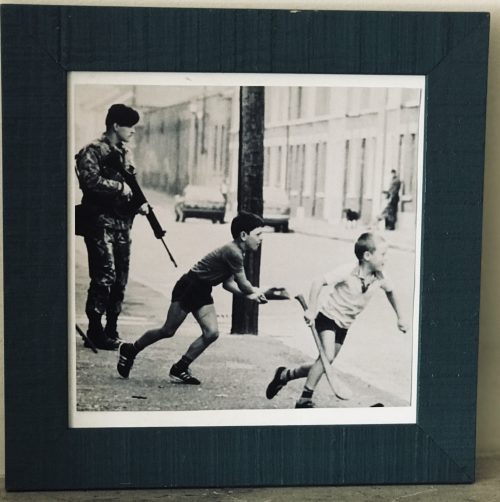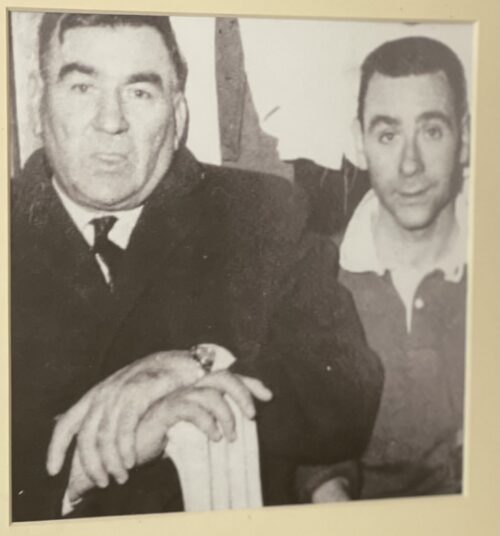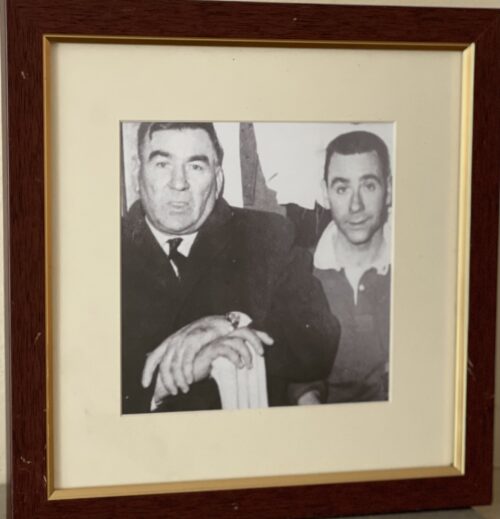-
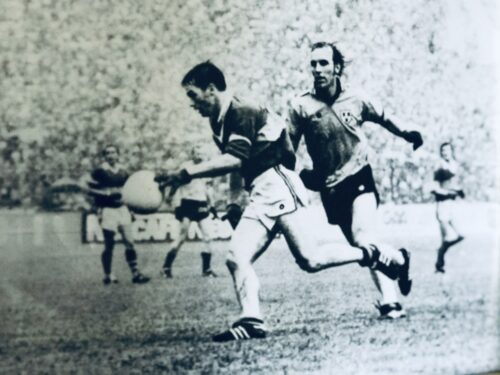
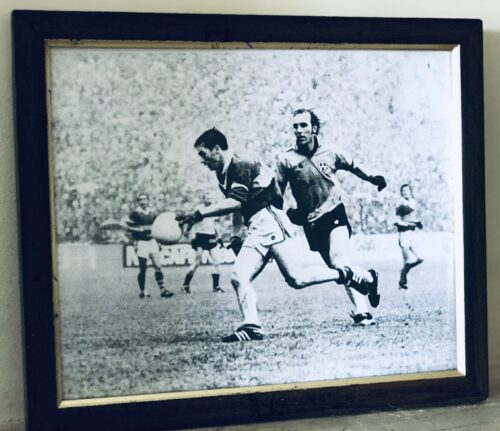 23cm x 29 cm. Baldoyle Dublin Atmospheric photo of Brian Mullins of Dublin following Paidi O Se of Kerry on a rain sodden Croke Park in 1978 Con’s description of Kerry player Mikey Sheehy’s free in the 1978 All Ireland Football Final between Dublin v Kerry is still the stuff of legend and is worth quoting again. Con wrote: “Dublin were like climbers who had been driven down the mountain by a rock fall – they had to set out again from the plateau not far from the base. And now came the moment that will go into that department of sport’s museum where abide such strange happenings as the Long Count and the goal that gave Cardiff their only English FA Cup and the fall of Devon Loch. Its run-up began with a free from John O’Keefe, deep in his own territory. Jack O’Shea made a flying catch and drove a long ball towards the middle of the 21 -yard line. Mikey Sheehy’s fist put it behind the backs, breaking along the ground out toward Kerry’s right. This time Paddy Cullen was better positioned and comfortably played the ball with his feet away from Sheehy. He had an abundance of time and space in which to lift and clear but his pick-up was a dubious one and the referee Seamus Aldridge, decided against him. Or maybe he deemed his meeting with Ger Power illegal. Whatever the reason, Paddy put on a show of righteous indignation that would get him a card from Equity, throwing his hands to heaven as the referee kept pointing towards goal. And while all that was going on, Mikey Sheehy was running up to take the kick-and suddenly Paddy dashed back towards his goal like a woman who smells a cake burning. The ball won the race and it curled inside the near post as Paddy crashed into the outside of the net and lay against it like a fireman who returned to find his own station ablaze. Sometime, Noel Pearson might make a musical of this amazing final and as the green flag goes up for that crazy goal he will have a banshee crooning: “And that was the end of poor Molly Malone.” And so it was. A few minutes later came the tea-break. Kerry went into a frenzy of green and gold and a tumult of acclaim. The champions looked like men who worked hard and seen their savings plundered by bandits.” .
23cm x 29 cm. Baldoyle Dublin Atmospheric photo of Brian Mullins of Dublin following Paidi O Se of Kerry on a rain sodden Croke Park in 1978 Con’s description of Kerry player Mikey Sheehy’s free in the 1978 All Ireland Football Final between Dublin v Kerry is still the stuff of legend and is worth quoting again. Con wrote: “Dublin were like climbers who had been driven down the mountain by a rock fall – they had to set out again from the plateau not far from the base. And now came the moment that will go into that department of sport’s museum where abide such strange happenings as the Long Count and the goal that gave Cardiff their only English FA Cup and the fall of Devon Loch. Its run-up began with a free from John O’Keefe, deep in his own territory. Jack O’Shea made a flying catch and drove a long ball towards the middle of the 21 -yard line. Mikey Sheehy’s fist put it behind the backs, breaking along the ground out toward Kerry’s right. This time Paddy Cullen was better positioned and comfortably played the ball with his feet away from Sheehy. He had an abundance of time and space in which to lift and clear but his pick-up was a dubious one and the referee Seamus Aldridge, decided against him. Or maybe he deemed his meeting with Ger Power illegal. Whatever the reason, Paddy put on a show of righteous indignation that would get him a card from Equity, throwing his hands to heaven as the referee kept pointing towards goal. And while all that was going on, Mikey Sheehy was running up to take the kick-and suddenly Paddy dashed back towards his goal like a woman who smells a cake burning. The ball won the race and it curled inside the near post as Paddy crashed into the outside of the net and lay against it like a fireman who returned to find his own station ablaze. Sometime, Noel Pearson might make a musical of this amazing final and as the green flag goes up for that crazy goal he will have a banshee crooning: “And that was the end of poor Molly Malone.” And so it was. A few minutes later came the tea-break. Kerry went into a frenzy of green and gold and a tumult of acclaim. The champions looked like men who worked hard and seen their savings plundered by bandits.” . -
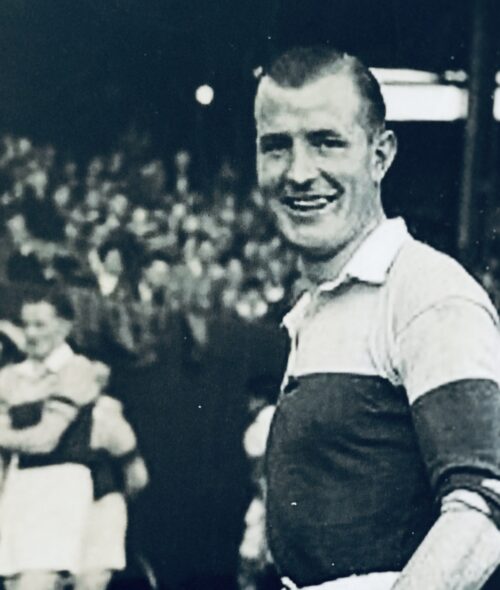
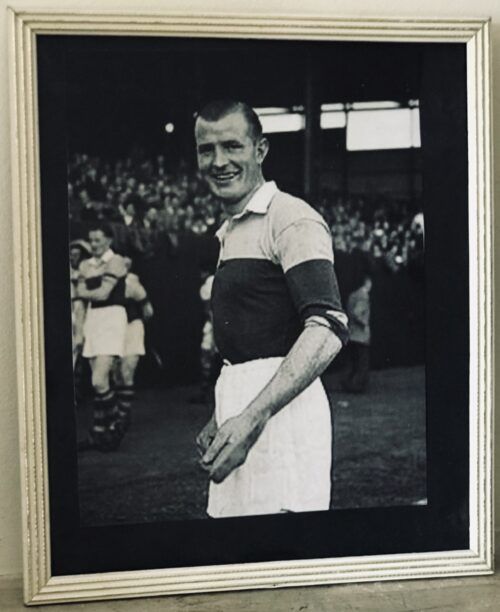 Poignant portrait of all time Wexford Hurling Great Nicky Rackard Enniscorthy Co Wexford 35cm x32cm "I was lucky enough to be on a Wexford team that he was involved with," recalled Liam Griffin. "He put his hand on my shoulder and that was like the hand of God touching you. "He was a fantastic man and his presence was just unbelievable. To see him standing there in a dressing-room, you wouldn't be worried about going out on the pitch, you'd just be looking at him." Despite his many years of service to Wexford GAA, Nicky Rackard's life was cut tragically short and at only the age of 53, the legendary hurler passed on after a battle with cancer. As Liam Griffin recalled on OTB AM, Rackard had also had his struggles with alcohol. "He was a gentleman as well, but look, he had his problems when he wasn't a gentleman as well when he had drink taken like most people," he explained. "But look, he was an inspiration too because he went on to do great work for alcoholics and so forth. "But I'm just going to say this, and I'm not saying this to be smart but because I mean it sincerely. After the All-Ireland final when we won it we put the cup in the middle of the floor the next morning after the All-Ireland. "In my view, he'd had such an influence on me and what we were that we stood around the cup and said a few prayers, and I'm not ashamed to say that I can tell you. "I warned them, and I meant it because I had thought about it in the previous weeks and months before, about any of them becoming an alcoholic, like Nicky Rackard. "He was one of the greatest but hero-worship is dangerous and when they walked out that door their lives would change forever. Nicky's life was spoiled by the worship he received and that's an unintended consequence, but it is the truth." The prominent figure upon Wexford's Mt Rushmore in Liam Griffin's opinion, whatever of Nicky Rackard's troubles in life, Griffin believes his legacy as a hurler is unsurpassed. "He led Wexford when we hadn't fields of barley let me tell you, we had pretty barren fields," he recalled. "Nicky Rackard carried on through a lot of thick and thin with Wexford, through a lot of heartache but he eventually put his flag on the top of the mountain. "He's #1 in Wexford, that's for sure."
Poignant portrait of all time Wexford Hurling Great Nicky Rackard Enniscorthy Co Wexford 35cm x32cm "I was lucky enough to be on a Wexford team that he was involved with," recalled Liam Griffin. "He put his hand on my shoulder and that was like the hand of God touching you. "He was a fantastic man and his presence was just unbelievable. To see him standing there in a dressing-room, you wouldn't be worried about going out on the pitch, you'd just be looking at him." Despite his many years of service to Wexford GAA, Nicky Rackard's life was cut tragically short and at only the age of 53, the legendary hurler passed on after a battle with cancer. As Liam Griffin recalled on OTB AM, Rackard had also had his struggles with alcohol. "He was a gentleman as well, but look, he had his problems when he wasn't a gentleman as well when he had drink taken like most people," he explained. "But look, he was an inspiration too because he went on to do great work for alcoholics and so forth. "But I'm just going to say this, and I'm not saying this to be smart but because I mean it sincerely. After the All-Ireland final when we won it we put the cup in the middle of the floor the next morning after the All-Ireland. "In my view, he'd had such an influence on me and what we were that we stood around the cup and said a few prayers, and I'm not ashamed to say that I can tell you. "I warned them, and I meant it because I had thought about it in the previous weeks and months before, about any of them becoming an alcoholic, like Nicky Rackard. "He was one of the greatest but hero-worship is dangerous and when they walked out that door their lives would change forever. Nicky's life was spoiled by the worship he received and that's an unintended consequence, but it is the truth." The prominent figure upon Wexford's Mt Rushmore in Liam Griffin's opinion, whatever of Nicky Rackard's troubles in life, Griffin believes his legacy as a hurler is unsurpassed. "He led Wexford when we hadn't fields of barley let me tell you, we had pretty barren fields," he recalled. "Nicky Rackard carried on through a lot of thick and thin with Wexford, through a lot of heartache but he eventually put his flag on the top of the mountain. "He's #1 in Wexford, that's for sure." -
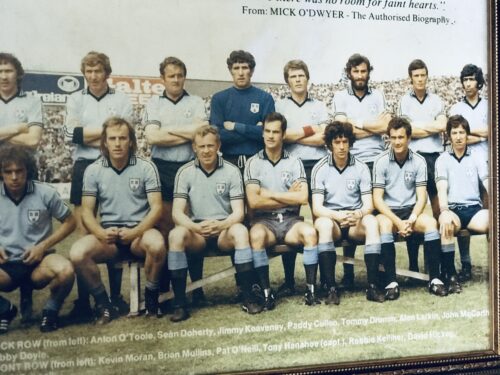
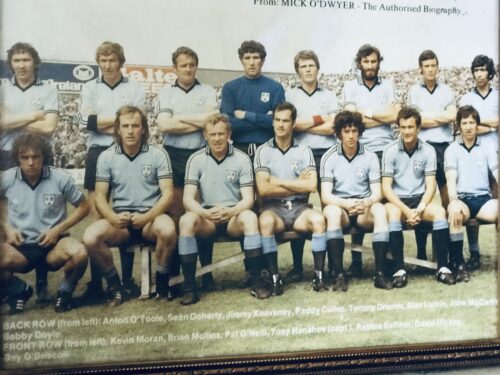 Team photo from before the 1977 All Ireland SemiFinal of that great Dublin side. Dublin 22cm x 27cm here have been many memorable battles between Dublin and Kerry down through the years, but the meeting between the two sides on the 21st of August 1977 has been described many times as the greatest game of all time. The country was gripped by this fierce rivalry that built up through the 70’s. This was the third year in a row that the two sides went toe to toe with both teams up claiming a win each. The game started at a furious pace that didn’t wane for the entire match. Dublin missed a couple of early goal chances and it was Kerry’s Seán Walsh hit the first three pointer to leave a goal between the sides at the break. Dublin though dominated the midfield sector particularly with the second half introduction Bernard Brogan. With the Dubs in the ascendancy early in the second period they took full advantage and a John McCarthy goal leveled the game brought them right back into it. The action flowed from one end of the Croke Park pitch to the other with the sides exchanging a flurry of points. The intensity levels rose dramatically both on the pitch and in the stands as this thriller continued to enthrall and excite throughout. But two late goals clinched it for Kevin Heffernan’s men, Tony Hanahoe gathered a loose ball around the middle, passed it off to David Hickey who strode forward and hit a brilliant shot to the back of the net for Dublin’s second goal. Just before the final whistle the Sky Blues grabbed their third goal, a sweeping move involving David Hickey, Tony Hanahoe and Bobby Doyle seen the ball end up in the hands of Bernard Brogan who unleashed a rocket which almost took the net off the goal and Dublin claimed a well deserved victory.
Team photo from before the 1977 All Ireland SemiFinal of that great Dublin side. Dublin 22cm x 27cm here have been many memorable battles between Dublin and Kerry down through the years, but the meeting between the two sides on the 21st of August 1977 has been described many times as the greatest game of all time. The country was gripped by this fierce rivalry that built up through the 70’s. This was the third year in a row that the two sides went toe to toe with both teams up claiming a win each. The game started at a furious pace that didn’t wane for the entire match. Dublin missed a couple of early goal chances and it was Kerry’s Seán Walsh hit the first three pointer to leave a goal between the sides at the break. Dublin though dominated the midfield sector particularly with the second half introduction Bernard Brogan. With the Dubs in the ascendancy early in the second period they took full advantage and a John McCarthy goal leveled the game brought them right back into it. The action flowed from one end of the Croke Park pitch to the other with the sides exchanging a flurry of points. The intensity levels rose dramatically both on the pitch and in the stands as this thriller continued to enthrall and excite throughout. But two late goals clinched it for Kevin Heffernan’s men, Tony Hanahoe gathered a loose ball around the middle, passed it off to David Hickey who strode forward and hit a brilliant shot to the back of the net for Dublin’s second goal. Just before the final whistle the Sky Blues grabbed their third goal, a sweeping move involving David Hickey, Tony Hanahoe and Bobby Doyle seen the ball end up in the hands of Bernard Brogan who unleashed a rocket which almost took the net off the goal and Dublin claimed a well deserved victory. -

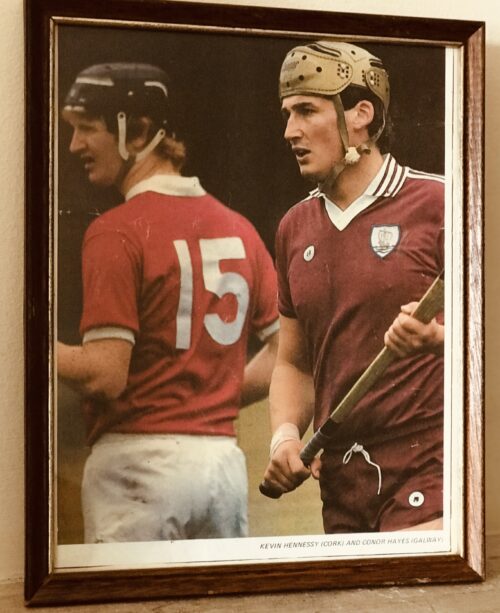 Real retro GAA hurling photo here of Kevin Hennessy of Cork & Conor Hayes of Galway marking each other in an All Ireland Final.Conor is wearing what appears to be a very old Cooper Ice hockey Head guard and it became his signature piece during his career as Galway Captain and Full Back. Kiltormer Co Galway 29cm x 23cm Conor Hayes was a three-time All-Star. He made his debut for the Galway senior hurlers during the 1979 championship and went on to play a key role for the Tribesmen for over a decade, winning three All-Irelands and two National Leagues. He was captain when Galway won back-to-back All-Ireland titles in 1987 and 1988. Conor is also an All-Ireland winner at club level, having achieved the highest honour in club hurling with Kiltormer in 1992. He is the holder of two Connacht club championships and three Galway hurling championships with Kiltormer and was named on the Galway Hurling Team of the Millennium. Kevin Hennessy (born 8 March 1961) is an Irish retired hurler who played as a left-corner forward for the Cork senior team. Born in Midleton, County Cork, Hennessy first arrived on the inter-county scene at the age of 18 when he first linked up with the Cork minor team, before later lining out with the under-21 side. He made his senior debut in the 1982 championship. Hennessy went on to play a key part for over a decade, and won three All-Ireland medals and seven Munster medals. He was an All-Ireland runner-up on three occasions. Hennessy represented the Munster inter-provincial team in the early stages of his career, winning two Railway Cup medals. At club level he won one All-Ireland medal, two Munster medals and four championship medals with Midleton. Throughout his career Hennessy made 22 championship appearances for Cork. He retired from inter-county hurling following the conclusion of the 1993 championship.
Real retro GAA hurling photo here of Kevin Hennessy of Cork & Conor Hayes of Galway marking each other in an All Ireland Final.Conor is wearing what appears to be a very old Cooper Ice hockey Head guard and it became his signature piece during his career as Galway Captain and Full Back. Kiltormer Co Galway 29cm x 23cm Conor Hayes was a three-time All-Star. He made his debut for the Galway senior hurlers during the 1979 championship and went on to play a key role for the Tribesmen for over a decade, winning three All-Irelands and two National Leagues. He was captain when Galway won back-to-back All-Ireland titles in 1987 and 1988. Conor is also an All-Ireland winner at club level, having achieved the highest honour in club hurling with Kiltormer in 1992. He is the holder of two Connacht club championships and three Galway hurling championships with Kiltormer and was named on the Galway Hurling Team of the Millennium. Kevin Hennessy (born 8 March 1961) is an Irish retired hurler who played as a left-corner forward for the Cork senior team. Born in Midleton, County Cork, Hennessy first arrived on the inter-county scene at the age of 18 when he first linked up with the Cork minor team, before later lining out with the under-21 side. He made his senior debut in the 1982 championship. Hennessy went on to play a key part for over a decade, and won three All-Ireland medals and seven Munster medals. He was an All-Ireland runner-up on three occasions. Hennessy represented the Munster inter-provincial team in the early stages of his career, winning two Railway Cup medals. At club level he won one All-Ireland medal, two Munster medals and four championship medals with Midleton. Throughout his career Hennessy made 22 championship appearances for Cork. He retired from inter-county hurling following the conclusion of the 1993 championship.

